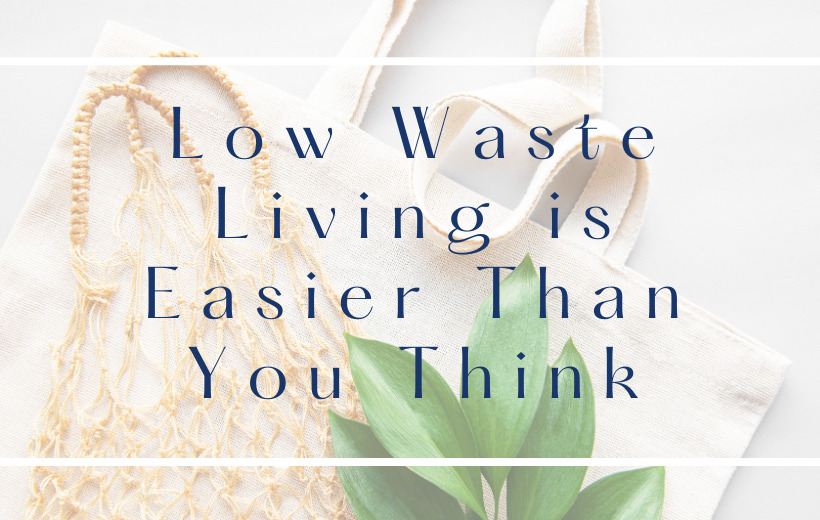A great way to take charge of your environmental footprint is to focus on how to reduce your trash and waste. Zero waste is a major buzzword these days but I hesitate to use it here because for the majority of people it’s not going to be a realistic goal in the long term. The concept of going “Zero-Waste” creates a very black and white view of sustainability that says either go zero waste or don’t bother trying at all. I think it’s great that there are people out there who can fit an entire year’s worth of trash into a mason jar, but for the rest of us for whom that’s not a realistic option there are some easy and long lasting ways we can reduce our trash. So let’s call it Low Waste Living.
Here in the Bloom and Spark community we’re all about discovering ways we can create a more mindful and intentional life in a realistic way. Because I’m not perfect and I certainly don’t do things perfectly, it’s important for me to share how I work sustainability into my life in a realistic, and often imperfect, way. I encourage you to do things that work for your particular lifestyle. There’s no purpose in adopting an extreme way of doing things that you don’t see yourself doing it for the long term. Trying to go zero waste when you know it’s not going to last is akin to doing a crash diet, when you have no intention of cleaning up your eating habits for the long term.
Remember, you don’t have to do everything perfectly to make low waste living a part of your life. Some areas that aren’t practical for your life or your family will not be perfectly low waste and that’s ok. Maybe you have a baby and cloth diapers are just not a realistic option for your busy schedule, get the disposable diapers and make eco friendly choices in another area of your life. Or perhaps you live in a city and have a very small kitchen so you get a lot of takeout. You can see if certain restaurants let you bring your own takeout containers, or you can continue to get takeout and cut down on your trash in other ways. If you are making changes in other areas and doing them for the long term that makes a difference.
What I am hoping to shed some light on is the concept of low waste living, which to me means making changes that are realistic for us and our families that will be long lasting, and it means being mindful of the amount of waste we produce. Every time you open that trash can think “can I reduce my use of this item? Can I repair or reuse this before I throw it away? Can I recycle it? Can it be composted?” If the answer to all those questions is no, then in the trash it goes. If one of those questions can be answered with a “yes” or even a “posssibly” then you have the perfect opportunity to practice low waste living!
Here are 5 Great Ways to Start Practicing Low Waste Living
Water bottles
Unless you live in an area with truly unsafe drinking water (and unfortunately those places still exist in this country) there’s no reason you should be using a plastic water bottle. Get yourself a pretty reusable water bottle and fill it up at the beginning of each day. I never leave home without mine, whether it’s to go to a yoga class or run errands. Remember friends, the goal isn’t perfect, if you use your reusable water bottle 80% of the time that’s still a lot of plastic water bottles you’ve saved from a landfill. Don’t beat yourself up if you forget it once in a while as you are developing this habit. These things take time but it pays in the long run.
Coffee cups
Leave a reusable coffee mug or to-go mug in your office or in your car. You could also put it next to your reusable water bottle on the counter each day so you remember to take it with you. This doesn’t mean you can’t get your beloved Starbucks on your lunch break, just bring your reusable mug. *I should note that during the Covid-19 Pandemic many places have stopped allowing the use of reusable coffee mugs to avoid cross contamination, which is obviously important, but whenever you can bring your reusable mug, even if you are only using it half of the time, that’s still a lot of trash you’ve saved. Look at you being all low waste!
Reusable shopping bags
Let’s also lump produce bags into this one. Why would I make the effort to take reusable grocery bags to the store, then use the plastic produce bags for all my fruits and veggies? Sillyness is what it is! I also want to say that these are not just for the grocery store anymore. Have a couple of canvas totes in your car or fold up bags in your purse to take whenever you go out shopping. Of course this is a habit that won’t develop over night. What I’ve done to make it easier is whenever I am done emptying my groceries I take my reusable grocery bags and put them by the door so the next time I go into my car I take them with me. Also be realistic, the whole point of a bag is if you have a lot of things it’s easier to carry. But if you only bought one or two things in a store you don’t actually need a bag at all. So if I can carry what I bought in my hands I the cashier “no bag please.”
Straws
Straws are easy to avoid because the majority of us don’t actually need them. Maybe for thick smoothies and for people with disabilities straws are a necessity, but for most of us they’re just not needed. Good restaurants will ask you if you want a straw, always refuse, or beat them to the punch and order your drink sans straw.
Compost
For a long time I though “If food waste can decompose it doesn’t matter if it’s in a landfill or a compost bin so what’s the point of composting?” Here’s the hard truth: food waste that goes into the landfill that could have been composted is actually more harmful than the other trash you throw away because it produces methane, a potent greenhouse gas, as it decomposes. A whopping 40% of landfills are food waste that could have been diverted into compost. If you aren’t composting think of other ways you can repurpose food scraps like making a broth or using them as natural dye.
Remember this is a marathon, not a sprint. If this seems overwhelming to you maybe you pick one area from this list to try to implement for the next few months. I try to do a decent job in all of these areas but there are some in which I am definitely not perfect. When I’m feeling lazy I throw food scraps into the trash, and sometimes I forget to bring my reusable coffe mug and bags when I go out. The big picture is that when we make these habits a part of our every day lives we are doing two things: 1) Reducing the amount of waste we leave on this planet, and 2) Teaching the younger generations (because you know kids watch how we do everything) eco friendly habits that they will carry with them for their whole lives.


